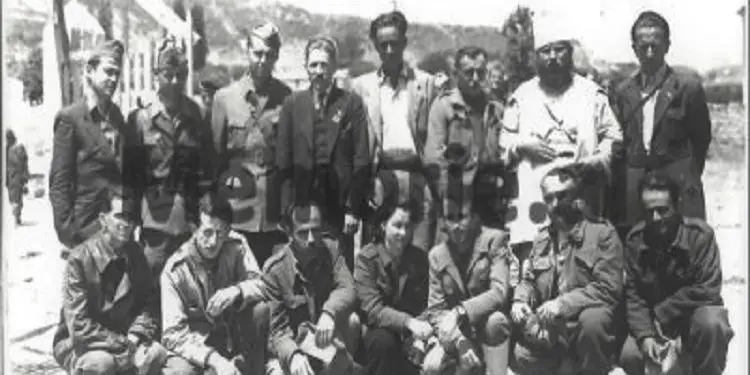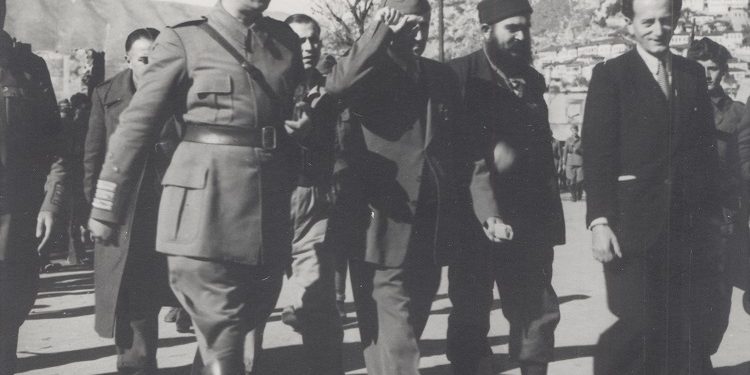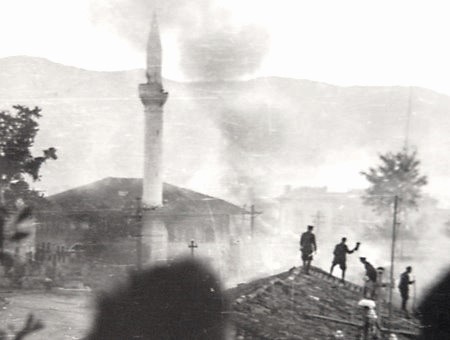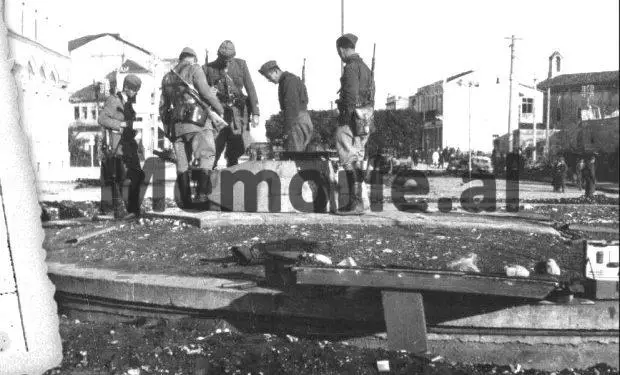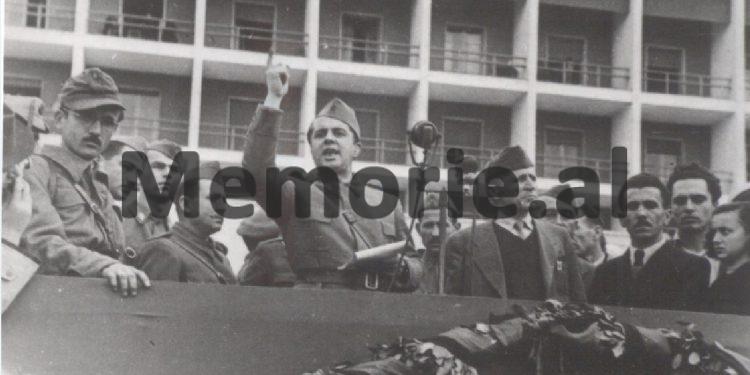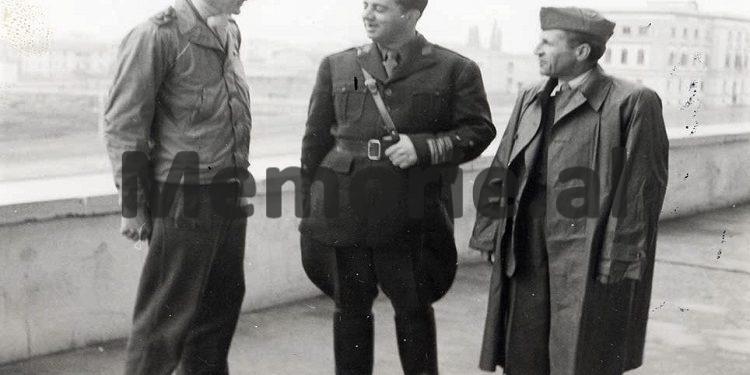By Franco Benanti
The second part
Memorie.al / The Second World War had a powerful impact on Albanian lands as well. A lot has been said about this by our historians, in the communist spirit. The generations before 1990, have learned this from textbooks, from the History of the Labor Party and the History of Albania, but very few eyes have been familiar with the alternative treatment made by non-communist historians and authors, inside and outside the country. In this regard, the book “La guerra piu lunga” by Franco Benanti, a former doctor in the Italian occupying army, in the Balkans and Albania, published by the “Mursia” house in Milan (first edition in 1966, followed by four reprints) is of great interest later).
Continues from last issue
The Permet Congress and the June Operation
On the eve of the Permet Congress, I was sent there to serve as a doctor. There I was met by Hysni Kapo, who thanked me for the services I had previously rendered in Lapardha and elsewhere. In the temporary infirmary, Gogo Nushi came every day to inform us about what was going to be discussed at the congress. Although communist propaganda presented the congress as a representation of the entire Albanian people, in fact, only one-twentieth of it was represented there, and it could even be called the congress of the Communist Party.
A General National-Liberation Council of 121 members was elected, which produced a Steering Committee, with a chairman, three vice-chairmen, two secretaries and 24 members. This Committee had legislative and executive attributes. The ranks in the army were announced, Enver Hoxha was elected Commander-in-Chief and Spiro Moisiu Chief of the General Staff. Congress banned the return of King Bird and canceled its agreements with foreigners. It put the fight to the end, with every other political party in the country.
Dushan Mugosha and Miladin Popovici, who participated in the congress, left on May 28. The Yugoslav envoys had conducted several political courses with Albanian cadres. It is worth noting the extreme servility and hypocrisy that the Albanian leaders showed towards the Yugoslavs. For example, Tuk Jakova wrote that; “You left us orphans, how can I walk without you…”?! Mehmet Shehu wrote that; “Without you, we would not have been able to create our party, you have shown yourself as a mother to us”.
The letter also bore the signature of Fiqerete Shehu, then commissar of the 1st Assault Brigade. On their part, Enver Hoxha and Nexhmie Xhuglini wrote that; “Albanian partisans feel the absence of their Yugoslav comrades.” Koçi Xoxe, Bedri Spahiu, Hysni Kapo and Ramadan Çitaku also wrote in this spirit.
For their part, the Yugoslav envoys reported to their leadership that; “The Albanian high command consists of people without minimal military, cultural and political training. Therefore, let’s send a military and political expert to lead their General Staff”.
In the meantime, the Germans launched the second major offensive, in order to secure the routes of their withdrawal through Albania, to Germany, and of the army, to Greece. This coincided with the opening of the Second Front in Europe and the Soviet offensive in Romania. Four divisions and part of the Alpine Division, about 70,000 soldiers, were engaged. About 10,000 Albanian collaborationists came to help.
The partisans had created the 1st Assault Division. When the Germans were about 50 km., near Përmet, the commissar of the Gogo Nushi hospital, ordered us to carry all the sanitary materials and move quickly. Dozens of mules were put to work, also for the wounded and sick.
The General Staff, the hospital and the partisans constituted a column of 1000 people. Even in this march, the scene of the killing of those sick, which could not continue the march, was repeated, which showed the severe conditions where the partisans were. I understood this from the shots I heard from time to time.
In the vicinity of Tomorica, German forces coming from Greece encountered the 1st Division. After fierce fighting, several hundred partisans were captured, while the rest escaped through the mountains. I remember what we lost those days, when we often hid in the woods, where the cold made us shiver like dogs. During the June Operation, around 1,500 partisans were killed. The injured and the sick cannot be counted. Some brigades lost nine-tenths of their strength, some disappeared altogether, others were scattered in complete disorder.
The end of the anti-Nazi war
In the first days of August, Vasil Konomi came and communicated to me the transfer to the reconstructed Second Brigade, which was based in Vithkuq, a village near Korça. I was surprised to see the village illuminated by electric light. There I met Beqir Balluk, who represented a typical Albanian, with all the instincts and traditions, from the time of the long war against the Turks. Before the war he had graduated from a sergeant’s school. When a brother was killed, he joined the partisans as revenge.
We left Vithkuq for a while, because the Germans started bombing. Later we returned there. In September, the movement of Germans to evacuate from the Balkans began. After Greece, it was Albania’s turn. At first, Saranda, Gjirokastra, Berati and Vlora were abandoned. On October 24, Korça was liberated and with it, the whole of South Albania. In Korça, I started working at the hospital, where the Italian sisters still served. Finally, I found an environment to be in, clean white sheets, warm water to wash away the slime and parasites from my body.
But the liberation of Korça and other cities was accompanied by a terror, unknown before. Many citizens were arrested and killed on the spot, accused of collaboration with the invaders and war crimes. Some of them were sent to forced labor. Others were taken out of their homes, to shelter in them the countless new communist officials, commanders and commissars, partisans who poured out of the mountains.
Korça, at an altitude of about 800 meters above sea level, was located in favorable traffic and development conditions. Many citizens had immigrated to Thessaloniki, Romania, Turkey, and Egypt, America, Australia and returning to their homeland, they had brought a certain well-being. An Italian, Umberto Uberti, in 1927, established in Korça a company for the production of Korça beer, with several hundred workers.
A plenum of the Central Committee of the Albanian Communist Party was held in Berat, where the opposition between the Albanian leaders appeared. Koçi Xoxe, supported by the Yugoslavs, accused Enver Hoxha, that; “instead of helping the workers, like Tuk Jakova, Kristo Themelko and Pandi Kristo, he speaks against them”.
Enveri intended to replace Koçi Xoxen with his friend, Liri Gega, who entrusted him with the duties of the Minister of the Interior and the director of the General Command Office. But in the plenum, under the pressure of Velimir Stojniç, it was decided that Liri Gega should be expelled from the Central Committee, but he did not accept Nako Spiru’s proposal to replace Enver Hoxha, contenting himself with the latter’s self-criticism.
The battle for Tirana and the liberation of the country
On November 12, the German troops left Elbasan, where they were gathered from the South, from Greece and Macedonia. But the German convoy coming to Tirana encountered a powerful ambush and fierce battle. On the one hand, a squadron of Italian aircraft attacked it at the Kharaba Pass, in favorable weather conditions for shooting, specially sent by the allied command of the English RAF, under Marshal Elliot, at the request of the British mission here and the General Staff partisan.
The motorized column was reduced tenfold, by the Italian aviation. 1,300 Germans were killed on the spot. One part was able to enter the city, while the other part was attacked by the partisans of the XVth Brigade in Mushqeta and Bërzhitë.
Two days after Elbasan, the Germans also left Durrës. Therefore, the battle for Tirana was getting ready. The plan for the liberation of Tirana was drawn up by Velimir Stojnič and Vojo Todorovici, the two Yugoslav military emissaries. These relayed orders orally to the I, IV, X and XVIII brigades. The last two arrived less late, which gave the Germans the opportunity to retreat to Shkodër.
At the end of October 30, the Germans had released the eastern part of Tirana, where the 1st and 4th Brigades entered. Partisans strongly attacked the Royal Palace and the “Shkumbini” barracks, but the Germans resisted. On November 15, the Germans left the capital en masse, leaving an improvised fortress in the center of “Skënderbe” square. There was a single soldier with a machine gun and many boxes of cartridges. This soldier resisted alone, for 36 consecutive hours, against the attacks of the 4th Brigade. Finally, when he ran out of ammunition, he killed himself. Thus, Tirana was liberated on November 17.
Italian fighters of the “Antonio Gramshi” Battalion also helped in the Tirana war. Many eyes were killed, in an effort to protect the civilian population, from the reprisals of the Germans. Among them was Major Massimo De Angelis. Among them was the Jesuit priest, Giovanni Fausti, who after the war was accused of terrorist activity and shot. For the Italians in Albania, the fall of the capital was a hope to return to their homeland.
On November 29, the Germans also left Shkodra and headed through Koplik to Podgorica. At the end of November, at the request of the Yugoslavs, the Partisan General Command of Albania sent the 5th and 6th Divisions to Yugoslavia, in search of the German division “Group E”. But the German units fought them fiercely. The part that remained of them, in February 1945, returned to Albania.
Meanwhile, the “Antonio Gramshi” battalion was transformed into a brigade, with 2,000 people. It had two 41 mm batteries. Later, this brigade was enlarged to the rank of a division. In May 1945, its soldiers were repatriated to Italy by sea. According to the partisan command, 28,000 people were killed in the war, 63,000 were wounded and 62,000 were maimed for life. These are only military.
The Italians in the Albanian liberation war
With the liberation of Albania, 19,000 Italian soldiers were repatriated to Italy by air and sea. Their names appear on the boarding lists, made known to the Albanian and British authorities. The number of Italian fighters and workers, as well as those killed, missing or maimed, is not precisely known. We know that at the beginning the Italians constituted eight battalions and seven artillery batteries.
In addition to the 19,000 Italian soldiers, repatriated in 1945, there are a few hundred eyes, scattered in South Albania and who entered Italy in random ways, in November 1944. In December, several hundred wounded and sick were repatriated, who they stayed in partisan hospitals. Others were repatriated during the war, when the supply ships came and returned to Italy.
Besides others, I emphasize that the partisan artillery was mainly in the hands of the Italians. Mortars, heavy and light machine guns, vehicles and all services from health to repairs have been in the hands of the Italians. In hospitals, infirmaries, ammunition depots, in telephone exchanges, in the offices of the intendant, in various offices, wherever a little technical experience was needed, there were Italians.
These specialists were kept in Albania even after the war, because they were absolutely irreplaceable. We add here the food materials, clothing and food utensils, military vehicles, radio stations, sanitary materials, all the resources available to the partisan army, in its 25 brigades, were taken from the Italian military warehouses, except for the materials supplied by the allies, on the line aerial.
The Italians, military and civil, helped strongly in the repair of roads, in the rebuilding of bridges, power plants, water pipes, etc. Even in agriculture, there is a lot to say, if we don’t forget those hundreds of Albanian families, who didn’t want to let go of the soldiers sheltered in them, because they really needed their culture. Regarding the latter, in addition to cases of humane behavior of Albanians towards Italians, there have also been some who were treated brutally, guarding them day and night with guns, so that they would work in their homes, in exchange for a piece of bread with onions garlic.
We should not forget the help of the Italian aviation, which has carried out 3.132 flights, in 3.269 hours, in the skies of Albania, releasing 612 kv. Bomb, on German targets, carrying out 618 reconnaissance flights, with machine gun and 61 actions, with dive bombing. After liberation, the Italians organized a regular supply service; Lecce-Tirana. On the way back, the Italian planes took a large number of wounded Albanians, who needed, especially orthopedic treatment, which could not be carried out in Albania. As Enver Hoxha himself said; “this help of the Italian soldiers forged the brotherhood of our two peoples”.
Under the communist government
The government created in Berat was transferred to Tirana, very soon after the liberation. One of the first orders of the government was the registration of all foreigners in Albania. It was primarily about the Italians, of whom only the civilians, in September 1943, reached 25,000 people.
Immediately, many eyes were assigned to forced labor in various sectors, destroyed by the war. Arrests increased in Tirana and other cities. However, in the parade in front of the government on November 28, there were also the fighters of the Italian “Gramshi” formations and the 41st artillery battery of the “Firenze” division.
How did Enver Hoxha get power?
During the Italian occupation in Albania, the Communist Party was not the only political party. Even in terms of the number of members, other parties were bigger. But Enver Hoxha used the war against Nazi-fascism to fight competing parties and create the foundations of the dictatorship of the proletariat. He used the advice of the Yugoslavs and used the style of Borgia and implemented the teachings of Stalin.
The Western allies have made a very serious mistake, considering the actions of the communist squads “secondary”. In Albania, as in Yugoslavia, the victory of the communists could be avoided. Here, as in other countries, there were also non-communist partisan movements. With the right political direction and the right material support, they could serve against the Germans better than the Communists.
An Albanian nationalist declared in 1944 to the English military missionaries: “In Albania, there are three parties, Nazi agents, communist agents and English agents. All this is quite natural. But we don’t understand why communist agents are being paid in English gold”?!
The Western allies allowed Enver Hoxha to gain power, causing a series of consequences in the European situation even tens of years later. The true character of the new Albanian government appeared with the 5 laws that were promulgated on December 15, 1944. The first law placed all industry and societies under state control. The second law prohibited the export of precious metals.
For offenders, 30 years in prison up to the death penalty with confiscation of all assets was provided. Another law was against war saboteurs and those who harbored and hid them. Even for these, the military court gave 30 years in prison or death. The fourth law spoke about the civil mobilization of “specialists”, Albanians and foreigners. Memorie.al
The next issue follows




